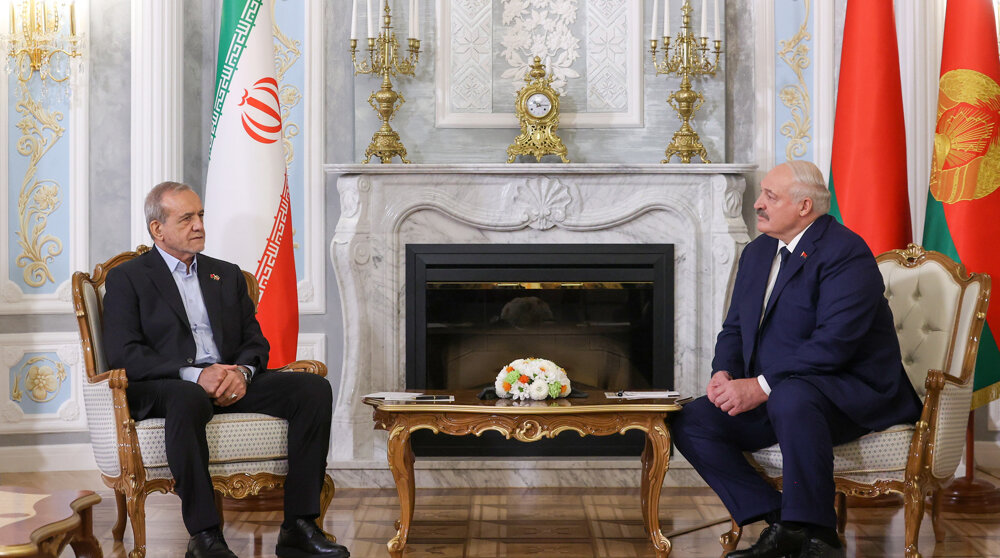‘Turning point’ for Iran-Belarus relations as new cooperation roadmap planned

TEHRAN – Iranian President Masoud Pezeshkian said his visit to Belarus marked a “turning point” in bilateral relations, stressing that Tehran sees no limits to strengthening cooperation with Minsk across political, economic, and cultural fields.
Speaking at a joint press conference with President Alexander Lukashenko on Wednesday, Pezeshkian praised Belarus as “a reliable partner in the strategic Eurasian region” and reaffirmed Iran’s commitment to fully implementing the 2023–2026 roadmap for cooperation between the two countries.
“Relations with Belarus are now being pursued at the highest level. This trip is a milestone in our ties, and its results will soon be visible in the expanding trend of cooperation,” Pezeshkian said. “Today, more than ever, we need cooperation to overcome unilateralism and its destructive consequences.”
Iran, Belarus sign 12 cooperation documents
During the visit, Iran and Belarus signed 12 cooperation documents and one joint statement in the presence of the two presidents. The agreements cover politics, international law, tourism, arts, media, health, pharmaceuticals, industry, environment, free zones, special economic and industrial zones, and investment.
Pezeshkian said the recent meeting of the Joint Economic Commission in Minsk, alongside the new agreements, will help deepen “mutually beneficial cooperation.” He highlighted areas such as customs coordination, joint investment, trade and transit, resolving private-sector obstacles, and securing vital goods.
He also underlined people-to-people ties: “In the field of media and cultural exchanges, we are ready for more effective cooperation to present an accurate image of both countries and promote mutual understanding of history, culture, and capacities,” he said, noting that several documents had been signed in this area.
The Iranian President thanked Belarus for condemning the recent attacks by Israel and the United States on Iran’s territory and peaceful nuclear facilities. Calling the strikes a “blatant violation of international law and the UN Charter,” Pezeshkian said Iran would continue to respond decisively to any aggression.
“The Islamic Republic has never initiated war or aggression. But if attacked, our response will be decisive and deterrent,” he said.
On June 13, Israel launched a wave of airstrikes against Iran’s military, nuclear, and security infrastructure. The war lasted 12 days and left at least 1,065 Iranians dead—mostly civilians, along with senior commanders and nuclear scientists. The United States openly backed the Zionist regime from the outset and directly entered the war on June 22 by striking three nuclear sites that Israel had already targeted.
Iran responded with Operation True Promise III, launching 22 waves of coordinated missile and drone attacks that devastated Israeli military, intelligence, security, and economic sites across the occupied territories. Analysts point out that while Iran inflicted serious damage, it deliberately refrained from deploying its most advanced and destructive weaponry.
The June 24 ceasefire, which was initiated at the request of both Washington and Tel Aviv, is described as only a temporary pause.
Iran considers a strategic partnership agreement with Belarus: Pezeshkian
Both sides stressed the importance of regional and multilateral cooperation, pointing to emerging structures such as the Eurasian Economic Union, BRICS, and the Shanghai Cooperation Organization (SCO) as platforms for boosting economic and political ties. Pezeshkian congratulated Belarus on its accession to BRICS and said Iran was ready to share its experience in resisting sanctions with “friends and partners.”
He added that Iran would consider a strategic partnership model with Belarus, similar to its treaty with Russia.
Later, in a meeting between senior delegations, Pezeshkian again thanked Lukashenko for his remarks at the recent Eurasian Economic Union Summit, in which he compared the Chernobyl disaster to the risks posed by attacks on Iran’s nuclear facilities.
Iran’s Foreign Minister Abbas Araghchi noted that trade between Tehran and Minsk rose 14 percent last year and urged the removal of visa requirements and drafting of a joint strategic document to elevate relations.
Iran’s Minister of Cultural Heritage, Tourism and Handicrafts, Reza Salehi Amiri, also highlighted tourism opportunities, suggesting direct flights and visa waivers to boost travel in both directions.
Pezeshkian closed by stressing that the current trade volume between Iran and Belarus is “negligible compared to capacities” and pledged to personally oversee the implementation of the new agreements: “Relations between our two nations must be built on a deeper and more sustainable foundation.”
Pezeshkian arrived in the Belarusian capital on Wednesday following a visit to Armenia. His two-day state visit is focused on bolstering political, economic, and cultural ties.
Leave a Comment